Lan 30mg (Lansoprazole)
Lan 30 mg (Lansoprazole) is a proton pump inhibitor used to reduce stomach acid, providing relief from conditions like acid reflux, GERD, peptic ulcers, and Zollinger-Ellison syndrome.
Lan 30 Capsule belongs to a group of antiulcer medicines called ‘proton pump inhibitors’ used to treat stomach and intestinal ulcers, inflammation of food pipe (oesophagus), gastro-oesophagal reflux disease – GERD (reflux of gastric contents into the oesophagus), heartburn, regurgitation, ulcers caused by the usage of pain killers, infections caused by Helicobacter pylori when given along with an antibiotic, and Zollinger-Ellison syndrome.
Lan 30 Capsule contains ‘Lansoprazole’ that works by blocking the action of an enzyme known as the gastric proton pump responsible for the production of acid. This helps in reducing the amount of acid produced, heals the ulcers and prevents the formation of new ulcers.
In some cases, you may experience certain common side-effects such as headache, dizziness, diarrhoea, constipation, nausea, vomiting, flatulence (wind), dry mouth, skin rash, itching, and tiredness. Most of these side-effects do not require medical attention and will resolve gradually over time. However, you are advised to talk to your doctor if you experience these side-effects persistently.
Inform your doctor if you have liver disease, or if you are due to have Chromogranin A blood test. Lan 30 Capsule may cause dizziness, so drive only if you are alert. Avoid consuming alcohol along with Lan 30 Capsule as it could lead to increased drowsiness and can elevate the production of stomach acid. Keep your doctor informed about your health condition and medicines to rule out any side-effects.
Side Effects of Lan 30 Capsule
- Headache
- Dizziness
- Diarrhoea
- Constipation
- Nausea
- Vomiting
- Flatulence (gas)
- Dry mouth
- Tiredness
Uses of Lan 30 Capsule
Directions for Use
Medicinal Benefits
Lan 30 Capsule belongs to a group of antiulcer medicines called proton pump inhibitors. Lan 30 Capsule is used to treat intestinal and stomach ulcers, inflammation of food pipe, gastro-oesophageal reflux disease (reflux of gastric contents into the oesophagus), heartburn, regurgitation, ulcers caused by the usage of NSAIDs, infections caused by Helicobacter pylori when given along with an antibiotic, and Zollinger-Ellison syndrome. Lan 30 Capsule works by blocking the action of the enzyme known as gastric proton pump that is responsible for the production of acid. This helps in reducing the amount of acid produced, heals the ulcers and prevents the formation of new ulcers.
How Lan 30 Capsule Works
Storage
- Inform Your Doctor: Notify your doctor immediately about your diarrhoea symptoms. This allows them to adjust your medication or provide guidance on managing side effects.
- Stay Hydrated: Drink plenty of fluids to replace lost water and electrolytes. Choose water, clear broth, and electrolyte-rich drinks. Avoid carbonated or caffeinated beverages to effectively rehydrate your body.
- Follow a Bland Diet: Eat easy-to-digest foods to help firm up your stool and settle your stomach. Try incorporating bananas, rice, applesauce, toast, plain crackers, and boiled vegetables into your diet.
- Avoid Trigger Foods: Steer clear of foods that can worsen diarrhoea, such as spicy, fatty, or greasy foods, high-fibre foods, and dairy products (especially if you’re lactose intolerant).
- Practice Good Hygiene: Maintain good hygiene to prevent the spread of infection. To stay healthy, wash your hands frequently, clean and disinfect surfaces regularly, and avoid exchanging personal belongings with others.
- Take Anti-Diarrheal Medications: If your doctor advises, anti-diarrheal medications such as loperamide might help manage diarrhoea symptoms. Always follow your doctor’s directions.
- Keep track of your diarrhoea symptoms. If they don’t get better or worse or are accompanied by severe stomach pain, blood, or dehydration signs (like extreme thirst or dark urine), seek medical help.
- Inform your doctor about the nausea and discuss possible alternatives to the medication or adjustments to the dosage.
- Divide your daily food intake into smaller, more frequent meals to reduce nausea.
- Opt for bland, easily digestible foods like crackers, toast, plain rice, bananas, and applesauce.
- Avoid certain foods that can trigger nausea, such as fatty, greasy, spicy, and smelly foods.
- Drink plenty of fluids, such as water, clear broth, or electrolyte-rich beverages like coconut water or sports drinks.
- Use ginger (tea, ale, or candies) to help relieve nausea.
- Get adequate rest and also avoid strenuous activities that can worsen nausea.
- Talk to your doctor about taking anti-nausea medication if your nausea is severe.
- Record when your nausea occurs, what triggers it, and what provides relief to help you identify patterns and manage your symptoms more effectively.
- Preventing Vomiting (Before it Happens)
- Take medication exactly as prescribed by your doctor. This can help minimize side effects, including vomiting.
- Having a small meal before taking your medication can help reduce nausea and vomiting.
- Talk to your doctor about taking anti-nausea medication along with your prescribed medication.
- Managing Vomiting (If it Happens)
- Try taking ginger in the form of tea, ale, or candy to help alleviate nausea and vomiting.
- What to Do if Vomiting Persists
- Consult your doctor if vomiting continues or worsens, consult the doctor for guidance on adjusting your medication or additional treatment.
- Prefer liquid food like juices and soups when you are not likely to eat.
- Avoid spicy, fatty and fried foods as they cause stomach upset.
- Eat small and frequent meals, avoiding large meals at a time.
- Add healthy foods in your diet like fruits and vegetables.
- Take starchy food like cereals, bread and potatoes etc.
- Eat potassium-rich foods like avocados, bananas, spinach, and potatoes.
- Stay hydrated by drinking plenty of water.
- Exercise regularly and maintain healthy weight.
- Manage stress.
- Prioritize 7-9 hours of sleep each night to help your body and mind recharge.
- Avoid smoking and limit intake of caffeine.
- Practice stress-reducing activities like meditation, yoga, or deep breathing to help calm your mind and body.
- Avoid stimulants and illegal drugs.
- Call your doctor if it worsens.
- Hydrate your body: Drink enough water to prevent dehydration and headaches.
- Calm Your Mind: Deep breathing and meditation can help you relax and relieve stress.
- Rest and Recharge: Sleep for 7-8 hours to reduce headache triggers.
- Take rest: lie down in a quiet, dark environment.
- Cold or warm compresses can help reduce tension.
- Stay Upright: Maintain good posture to keep symptoms from getting worse.
- To treat headaches naturally, try acupuncture or massage therapy.
- Over-the-counter pain relievers include acetaminophen and ibuprofen.
- Prescription Assistance: Speak with your doctor about more substantial drug alternatives.
- Severe Headaches: Seek emergency medical assistance for sudden, severe headaches.
- Frequent Headaches: If you get reoccurring headaches, consult your doctor.
- Headaches with Symptoms: Seek medical attention if your headaches include fever, disorientation, or weakness.
What if I have taken an overdose of Lan 30 Capsule
Drug Warnings
Do not take Lan 30 Capsule if you are allergic to any of its contents, or if you are taking atazanavir (used to treat HIV), anticancer medications (methotrexate) and blood thinner (warfarin). Inform your doctor if you have liver disease, or if you are due to have Chromogranin A blood test. Lan 30 Capsule may cause low magnesium levels, vitamin B12 levels, and increase the risk of bone fractures if taken for a longer duration; the doctor may advise regular tests for monitoring your condition. Consult your doctor if you are pregnant or breastfeeding. Lan 30 Capsule may cause dizziness, so drive only if you are alert. Prolonged intake of Lan 30 Capsule is linked with a greater risk of Clostridium difficile-associated diarrhoea, so if you develop diarrhoea that does not improve, immediately consult a doctor
| Quantity |
|---|
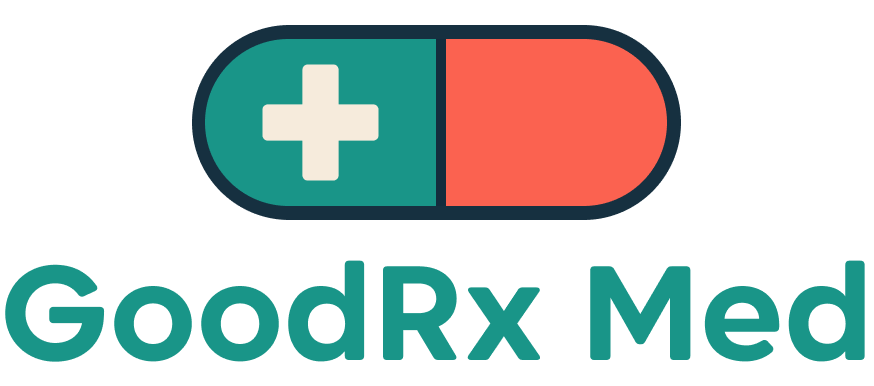
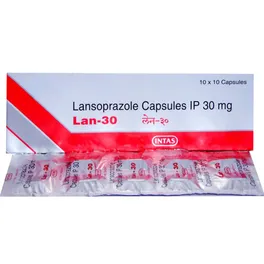
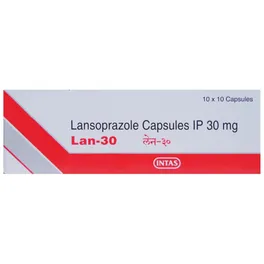
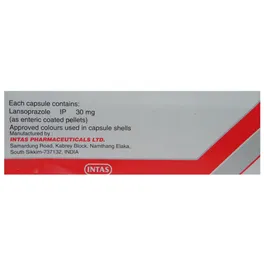
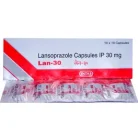
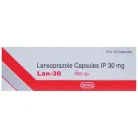

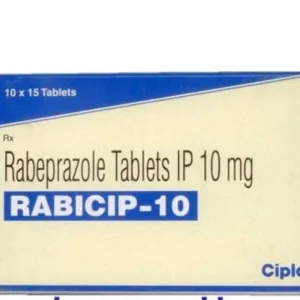
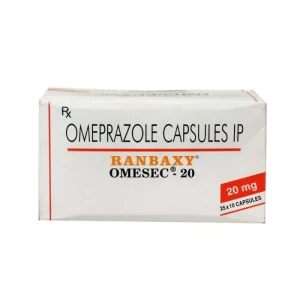
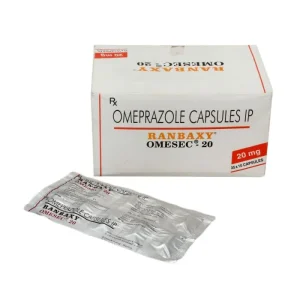
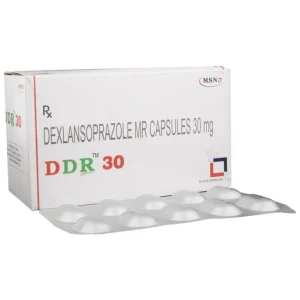
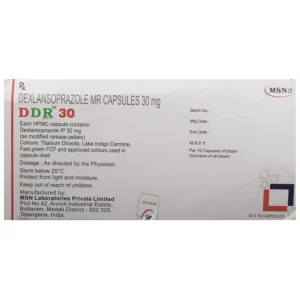
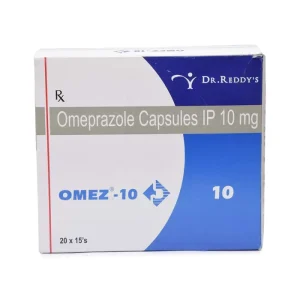
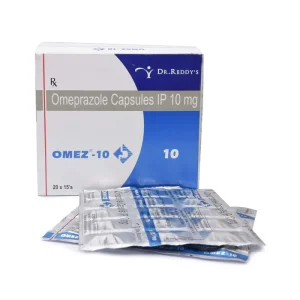
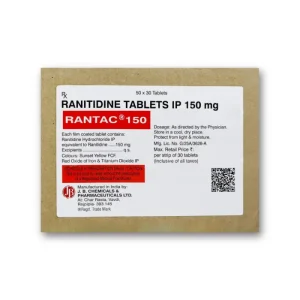
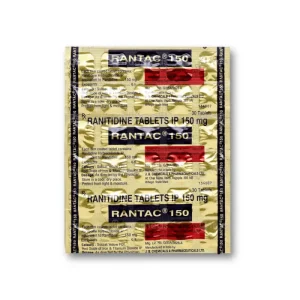
Reviews
There are no reviews yet.